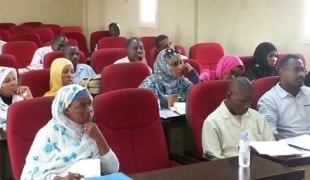The Max Planck Foundation for International Peace and the Rule of Law conducted capacity building workshops for Legal Counsels of the Sudanese Ministry of Justice and Lawyers of the Sudanese Bar Union on International Law over two weeks in September 2013, in Khartoum, Sudan
The workshops continued the cooperation between the Max Planck Foundation for International Peace and the Rule of Law and the two institutions in assisting the legal counsels and lawyers of the respective institutions in furthering and building the capacity of the institutions regarding aspects of international law with a special focus on the upcoming workshops on Borders and Water Law.
The research fellows delivered the workshops and provided all participants with tailored readers containing the relevant international, regional, and domestic legal provisions. The main topics covered in the workshops included the historical development of international law, the sources of public international law, the subjects of international law, the United Nations’ (UN) system and other UN agencies, regional organisations (particularly the African Union and COMESA), the law of treaties, state succession in treaty matters, and state responsibility. In accordance with the topics covered, the most important international agreements, treaties and conventions were introduced to the participants in English and Arabic in order to help familiarise the participants with the relevant provisions and the framework of the texts.
The legal documents introduced to the participants included the “Charter of the United Nations 1945”, the “Statute of the International Court of Justice 1945”, the “Vienna Convention on the Law of Treaties 1969” (VCLT), the “Vienna Convention on the Succession of States in respect of Treaty matters 1978” (VCSST), the “Charter of the Organisation of African Unity 1963”, and the “Constitutive Act of the African Union 2000”, amongst others. These were all provided to the participants in a specially compiled reader of legal documents. The conventions, bilateral and multilateral treaties that Sudan has ratified, and treaties that Sudan is bound by, by virtue of the provisions of the Interim National Constitution, were discussed and referred to at length in order to give participants in-depth familiarity with the relevant documents and the legal framework that regulated the various topics. Each of the concepts and legal provisions presented were supplemented with practical and comparative examples from state practice.
Since the secession of South Sudan from Sudan, the topic of Borders and Water Law is one that has gained in significance. This workshop was designed with a view to equipping the participants with the foundational knowledge and understanding for a subsequent workshop that dealt specifically with aspects of Borders and Water Law, particularly with a view to its importance for peaceful relations and for the socio-economic well-being of Sudan and its neighbouring States (especially Egypt and South Sudan) in respect of border disputes and the equitable use of shared resources.
The workshops were funded by the German Foreign Office, supported by the two institutions. They took place in the training halls of the Ministry of Justice building and the Sudanese Bar Union, respectively.

